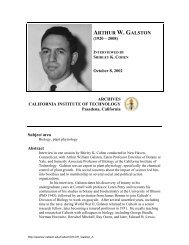Interview with Thomas A. Tombrello - Caltech Oral Histories
Interview with Thomas A. Tombrello - Caltech Oral Histories
Interview with Thomas A. Tombrello - Caltech Oral Histories
You also want an ePaper? Increase the reach of your titles
YUMPU automatically turns print PDFs into web optimized ePapers that Google loves.
<strong>Tombrello</strong>–98<br />
say she is, she’s going to find a way to tell you.” And so in this mountain of stuff that came to<br />
me, there are a couple of pages that she put together, “in case you’re curious about me.” It’s a<br />
little CV and a short bio, and, oh yeah, she found a way to tell me. Before I got there, I’d<br />
actually done a bit of work, and I made sure she was going to be my assistant.<br />
I knew I had to fire the head of one of the departments. I couldn’t do it until I got there,<br />
but I was already beginning to audition people. You would approach somebody you thought<br />
might be a candidate for the job and say, “Write me a visionary statement of what this<br />
department should do under the present circumstances.” There was a bit of that going on, too. I<br />
had a bit of luck that the chief financial officer was a woman I knew, Ellen Burns. She was<br />
going to be leaving the company to go into business for herself. She was an accountant, married<br />
to one of the senior scientists, whom I think she met at the lab. She was extremely helpful,<br />
because she told me where certain bodies were buried that were useful to know about. There<br />
were lots of things about the lab that did not appear on pieces of paper. There were mysteries,<br />
but she was quite willing to be candid about answering why these mysteries had occurred. So I<br />
had gotten a few months’ head start, even though officially nobody knew I was going to be<br />
running the lab—but since I was a consultant, I could get a lot of information from people. I<br />
could talk to them. I think only one person figured it out, and he figured it out about a day<br />
before the announcement.<br />
The job paid well, shall we say. It paid nicely. And it was a great education. It was an<br />
education in, first, being responsible for a lab. You paid the taxes. You paid the electrical bills.<br />
You had some dealings <strong>with</strong> the New York office, but you wrote the checks. If they got over a<br />
million dollars, you had to get some big vice president to countersign it, but, you know, a million<br />
dollars is a lot of money. They were very careful about how many people you could have on<br />
staff. They did want to keep some of the number of full-time equivalent employees. But that<br />
was not a terrible task to do. They didn’t micromanage at that point—which you can take as a<br />
hint that maybe they started micromanaging later.<br />
Our lab had to build some sort of relationship <strong>with</strong> the rest of the company, because<br />
Schlumberger may do research, but they’re a service company. They have an operating arm out<br />
in the oil patch. They do things for money. They make measurements in oil wells. They do<br />
seismic profiling. They’re a service business, and research is a tiny little piece pasted on top of<br />
all that. That’s the reason the case studies were important. They created a relationship <strong>with</strong> your<br />
http://resolver.caltech.edu/<strong>Caltech</strong>OH:OH_<strong>Tombrello</strong>_T

















